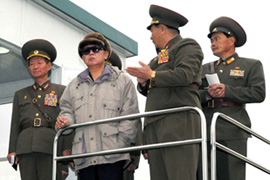N Korea healthcare ‘in crisis’
Right group paints bleak picture of health system lacking even basic necessities.

The report said the problems were compounded by the communist state’s increased isolation and government reluctance to seek international cooperation and assistance.
Many of North Korea’s 24 million people reportedly face health problems related to chronic malnutrition, such as tuberculosis and anemia, Amnesty said.
The report was based on interviews with more than 40 North Koreans who have defected, mostly to South Korea, as well as organisations and health care professionals who work with North Koreans.
However, Amnesty said its researchers did not have direct access to the country.
 |
| The North Korean government says healthcare is free for all of its citizens [AFP] |
The report, citing figures from the World Health Organisation (WHO), added that the North spent less on health care than any other country – under one dollar per person per year in total.
Catherine Baber, the deputy director of Amnesty International’s Asia-Pacific programme, told Al Jazeera that patients regularly pay doctors with cigarettes and food in order to access basic health services.
The North Korean government has not made any official response to the report, but has previously said health care is free for all.
However, Baber said many witnesses told them they have had to pay for all services since the 1990s.
“If you don’t have money, you die,” the report quoted a 20-year-old female refugee.
Screaming
It also quoted a 56-year-old woman from the northeastern city of Musan who underwent surgery to remove her appendix in 2001 without anaesthesia.
“I was screaming so much from the pain, I thought I was going to die. They had tied my hands and legs to prevent me from moving,” she said.
Baber added that many people bypass doctors and go to local markets to buy medicine, primarily drugs imported from China and which are narcotics-based.
Amnesty has urged the North to take effective measures to tackle food shortages, including accepting international assistance and ensuring the transparent delivery of food aid.
The rights group also called on the international community to support the UN’s “grossly underfunded” World Food Programme and other aid groups, to ensure the provision of aid is based on need and not political considerations.
“It is crucial that aid to North Korea is not used as a political football by donor countries,” said Baber.